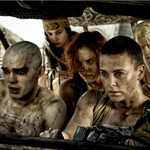
 a Vern Tells It Like It Is Adventure
a Vern Tells It Like It Is Adventure
WARNING: This essay is made up entirely of spoilers
Of the long list of things that are great about MAD MAX: FURY ROAD, one item that’s been getting alot of attention is its strong pro-woman vibe. People love its large cast of badass female characters and themes of escaping sex slavery, overthrowing a tyrannical patriarchy, etc. Surprised to see a movie with so much asskicking but also so many great female characters and themes, many have called it a “feminist action film.”
FURY ROAD is about as close to universally beloved as new movies come, but the stronger the praise the sweeter the temptation to backlash. A week in and we’ve already reached the “you guys said this movie is the ultimate feminist manifesto that will uplift women and change the world forever but I saw it and it’s some movie about cars and trucks driving around in the desert and exploding” stage. And of course there’s room in the world for anti-FURY ROAD sentiments, no need to shut down naysayers. But I’ve been looking for an excuse to write more about this movie, so thanks, I’ll take it!
The most annoyingly contrarian review I’ve seen passed around is “Actually, Mad Max: Fury Road Isn’t That Feminist; And It Isn’t That Good, Either” by Eileen Jones, a college professor and author of a book called Filmsuck, about how films suck. Some of her reasons why it’s not that feminist: the Wives are played by models, Charlize Theron has a “soft, tiny-nosed, blonde prettiness,” the consultant Eve Ensler couldn’t possibly know what it’s like to be Bosnian or Afghani. I was confused by her complaints of the “gorgeous color, red rock and rich umber sand against heartening blue sky,” which she feels is an example of “the scourge of color grading that’s afflicting so many action films.” I’m gonna have to get some action movie recommendations from her I guess because I haven’t seen enough of these Technicolor ones she’s so tired of.
But the one I respectfully disagree with and want to respond to is not actually a review, just some eyebrow-raising Twitter comments posted by the feminist media critic Anita Sarkeesian on Tuesday. I only ever heard of Sarkeesian because of the creepo video game players who harassed and threatened her because they disagreed with some of the points she made in web videos about elfs or Halos or whatever. So she’s okay in my book. I saw her on The Colbert Report once and now she’s one of Time Magazine’s 100 Most Influential People so alot of people (285K followers x 274 retweets) are listening when she she argues why FURY ROAD “isn’t feminist”:
I’m not one to shy away from expressing unpopular opinions. So here goes. I saw Fury Road. I get why people like it. But it isn’t feminist.
— Feminist Frequency (@femfreq) May 19, 2015
On the surface, Mad Max is about resisting a cartoonish version of misogyny. But that resistance takes the form of more glorified violence. — Feminist Frequency (@femfreq) May 19, 2015
Fury Road is different from many action films in that it lets some women participate as equal partners in a cinematic orgy of male violence.
— Feminist Frequency (@femfreq) May 19, 2015
Feminism doesn’t simply mean women getting to partake in typical badass “guy stuff”. Feminism is about redefining our social value system. — Feminist Frequency (@femfreq) May 19, 2015
Sometimes violence may be necessary for liberation from oppression, but it’s always tragic. Fury Road frames it as totally fun and awesome.
— Feminist Frequency (@femfreq) May 19, 2015
As a film Mad Max absolutely adores its gritty future. The camera caresses acts of violence in the same way it caresses the brides’ bodies. — Feminist Frequency (@femfreq) May 19, 2015
“We are not things” is a great line, but doesn’t work when the plot and ESPECIALLY the camera treats them like things from start to finish.
— Feminist Frequency (@femfreq) May 19, 2015
Mad Max’s villains are caricatures of misogyny which makes overt misogynists angry but does not challenge more prevalent forms of sexism. — Feminist Frequency (@femfreq) May 19, 2015
Viewers get to feel good about hating cartoon misogyny without questioning themselves or examining how sexism actually works in our society.
— Feminist Frequency (@femfreq) May 19, 2015
It makes me profoundly sad that mainstream pop culture now interprets feminism to mean “women can drive fast and stoically kill people too!” — Feminist Frequency (@femfreq) May 19, 2015
We’re starved for representations of powerful women but we need to re-imagine concepts of power & move beyond the glorification of violence.
— Feminist Frequency (@femfreq) May 19, 2015
I can’t disagree with one of her larger points: there needs to be equality in more than just cinematic asskicking (obviously), and a woman looking cool with a gun or a sword in a movie does not necessarily constitute a strong woman character or feminism. That’s been going on at least since the ’80s, when non-James Camerons did their hollow imitations of part-2-era Ripley and Sarah Connor and seemed to miss the point. They usually end up with characters who look cool but don’t have the humanity or gravitas of Ripley. They’re posers. That’s not the case with FURY ROAD’s lead Imperator Furiosa or her dozen or so supporting heroines, though. That’s why this has become a genuine cultural phenomenon and not just a new RESIDENT EVIL movie or something.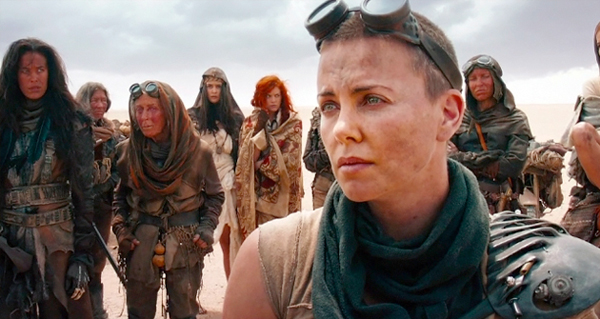
I think what Sarkeesian writes misunderstands what people are seeing in FURY ROAD and, worse in my book, snootily dismisses the entire genre of action. Charlize Theron, like other great women in action movies – Pam Grier, Michelle Yeoh, Cynthia Rothrock, Jeeja Yanin, Gina Carano, even Angelina Jolie and Milla Jovovich – is not just imitating “guy stuff,” she’s contributing to an ongoing artform. And she’s getting extra attention for this one because those of us who enjoy that artform are excited to see one where the point-of-view is so overtly pro-woman and anti-oppression.
That’s one of my favorite things: a movie that kicks ass but also has something to say about our world. So here I am to defend the value of badass movies with righteous subtext.
I guess first, unfortunately, I have to defend the idea of action movies at all. So bear with me a couple paragraphs. In her critique, Sarkeesian disparages “glorified violence” and “a cinematic orgy of male violence.” Man, I got it worse than the fuckin video game guys, because with them she’s coming from the point of view that video games can be better. Here it sounds like she thinks action movies are a no-go by definition. Since FURY ROAD is an action movie it has its female and male characters participate in the story through cinematic, imaginary, fake, glorious violence.
In life I am a non-violent person. I avoid fights, I’m against wars and murders, even capital punishment, I don’t like guns, I’m for peaceful solutions. In movies though I love to watch a perfect flying kick, a guy getting thrown through a window, a car flipping and exploding, a bloody samurai duel, or Chow Yun Fat sliding down a railing firing more bullets than a gun can hold. I don’t think it’s a contradiction, it’s normal. I’d guess that describes more people than it doesn’t. We know the difference between life and stories about life. Man, I haven’t driven a car in about 15 years, but I love every one of the FAST AND FURIOUS movies.
Those who don’t enjoy violence in movies, or feel that things that happen in fictional stories should be closer to their ideal version of what the world should be, have made a valid choice for their own lives. To assume that the rest of the world should share their tastes, though, is silly. I don’t subscribe to the idea that pretend violence in art is in some way immoral or needs to be avoided just because that’s true of real violence. Violence has always been a part of life and therefore a powerful source of drama.
Sarkeesian notes FURY ROAD’s “cartoonish version of misogyny,” but still assumes we’re taking the movie literally. In that limited view a woman driving fast and stoically killing people can only mean women can drive fast and stoically kill people. But this has never been the case with men in movies. In Joan Didion’s 1965 essay “JOHN WAYNE: a love song” she writes:
“When John Wayne spoke, there was no mistaking his intentions; he had a sexual authority so strong that even a child could perceive it. And in a world we understood early to be characterised by venality and doubt and paralysing ambiguities, he suggested another world, one which may or may not have existed ever but in any case existed no more; a place where a man could move free, could make his own code and live by it; a world in which, if a man did what he had to do, he could one day take the girl and go riding through the draw and find himself home free, not in a hospital with something going wrong inside, not in a high bed with the flowers and the drugs and the forced smiles, but there at the bend in the bright river, the cottonwoods shimmering in the early morning sun.”
She does not write:
“John Wayne could ride a horse and stoically kill Indians!”
That’s because movies and their characters mean more than that to the people who love them. When someone says they love Clint Eastwood, Charles Bronson, Bruce Lee or John McClane, they’re not talking about plans to shoot people or kick somebody or jump off a building with a firehose. They’re talking about an attitude, a way to carry themselves, a code, a discipline, a persistence, a way to see the world, a way to tackle life. The same is certainly true of Furiosa.
Just as Immortan Joe is not a realistic depiction of the specific methods of modern oppression, Furiosa, The Wives and the Vuvalini are not a recipe for how exactly women should behave in our actual, non-apocalyptic reality. They’re a legend, a tall tale, a comic book, but based on essential truths. We recognize aspects of Joe from politicians, warlords, religious leaders and assholes of all stripes, just as we recognize Furiosa’s strength, anger and pain from people we know, things we’ve seen or experienced. Sometimes larger-than-life is just the right size.
I think I’m more politically-minded than the average person, but more than that I’m artistically-minded. I love movies, and I love to analyze them on many different levels. If their politics or attitudes are in opposition to mine sometimes it bothers me, but it’s not always a dealbreaker. Movies are art, they’re not necessarily supposed to just be a list of things I agree with. It would probly be bad for my evolution as a person if they were.
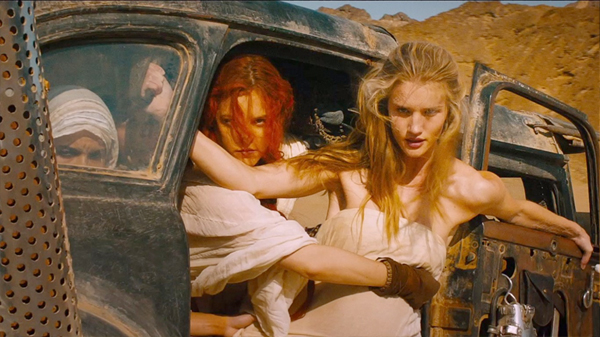
Here’s the problem with loving movies and the politics within them: you accidentally end up in movie debates with people who aren’t actually into movies. I’ve noticed a new wave of editorialists who seem to watch movies only to find something wrong with the politics. They zero in on their pet issue, which I’m all for. A great movie like FURY ROAD, or even a not-so great one like, let’s say THE GINGERDEAD MAN or something, is worth looking at from a million different angles. But too many of these anglers seem to have a poor understanding of how storytelling works, of metaphor, of larger cinematic history, the context of the genre or the filmmaker’s larger body of work, or just of the joy of watching movies. They mistake satire for sincerity and depiction for endorsement (call it WOLF OF WALL STREET Syndrome) and I feel like they’re cherry-picking evidence more than discovering a truth. Their often well-intentioned points about race or gender or whatever do more harm than good, because they promote this idea that people who care about those issues are joyless prigs who just look for something to be outraged by and don’t know what the fuck they’re talking about.
I’m not talking about Sarkeesian there, and I don’t know how much she loves movies. But I reject her implication that violent movies are inherently immoral and non-feminist. And even if they were, what then? Kung fu and car chase movies are not going away, you might as well hope for ones that promote equality within their framework.
I figure if you love movies you don’t have a political test they have to pass. I can appreciate DIRTY HARRY as one of the best cop movies ever, while considering its idea about police being held back by regulations to be bullshit. I can love FIRST BLOOD, and its depiction of macho stubbornness bringing the war home to smalltown USA, while questioning that part where he claims he was spit on by protesters at the airport and blames politicians for losing the war. I can laugh at the campily nationalistic anti-communist movies that I went to with my church in the ’80s.
But as a life-long action aficionado and a dyed in the wool liberal pinko I have an extra appreciation for the rare badass movies that seem to share more of my world view. There’s Tom Laughlin’s BILLY JACK series, about a pacifism-preaching but karate-practicing founder of a hippie school who always finds himself having to fight off rapists, racists and corrupt officials. There’s Steven Seagal’s goofy but heartfelt environmental warnings ON DEADLY GROUND and FIRE DOWN BELOW. There’s Paul Verhoeven’s savage caricatures of corporatization and violent policing (ROBOCOP) and warmongering (STARSHIP TROOPERS). There’s THE MATRIX, which to me has always been about (among other things) becoming aware and then learning to fight the system from within.
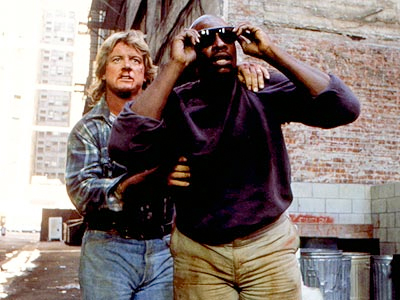
My very favorite in this department would be THEY LIVE, which has been claimed by many populist causes but was clearly made as an attack on the economic disparity and institutionalized selfishness of the Reagan years. The wealthy and the powerful are aliens or have sold out to aliens, the working class mostly refuse to even put on the sunglasses to find out the truth.
Sure, FURY ROAD is a better movie than it is a manifesto. As Sarkeesian points out, it merely allows us to root against bad people and their system, but probly doesn’t convince us that we are the bad people and enablers of the system. Let’s not let the perfect be the enemy of the good, though. I don’t think Miller set out to solve all these problems. He just made an action movie that comes from his world view, which happens to be a feminist one. It’s unusual for these ideas to be so deeply engrained in such a fun movie, so that’s one of the many things people are responding to.
Even more than I have a liberal bias I have a cinematic bias. If they say the right things but they don’t work as movies they’re out the door. I like a movie like THEY LIVE or FURY ROAD not just because of what it says but because it works as a great, entertaining movie anyway. Many times that includes “totally fun and awesome” violence. The best of these movies is a perfect balance of awesome and true.
In THE ROAD WARRIOR, savages drive around in circles wasting gas in pursuit of one precious commodity: more gas. Awesome, because those are colorful characters and great car chases, but true, because our entire civilization is fighting wars overseas to control the oil that we piss away at home. It’s allowed to be totally fun and awesome, and not just a lecture, because we are intelligent people who understand that this world of “fire and blood” is not the world we want to build, it’s a sick parody of where we’re worried we might be headed. The Wasteland of FURY ROAD is a place where an arms dealer (whose clothes and teeth are entirely made of bullets!) is blinded and still feels he should unload two machine guns while yelling about “the scales of justice.” It’s fun, we can laugh, but obviously that doesn’t mean we support what he’s doing or what it symbolically represents. A cool, entertaining movie with a point can be a far more powerful statement than a depressing slog through realistic, punishing, not fun or awesome violence (an approach which, by the way, almost always receives even more criticism from the anti-violence-in-movies people anyway. See the works of Gaspar Noe or Rob Zombie for example).
Sarkeesian writes that the camera caresses the Wives’ bodies. I really don’t believe they are photographically ogled, but my eyes certainly go to them before the hundreds of more-naked-than-them Warboys. I’m not qualified to argue about the male gaze, but I want to point out that when the plot “treats them like things” this is part of the point of the movie that so many people are excited about. It’s the world that treats them like things. People refer to them as “property”, “stolen stuff” and “treasure.” They’re locked in a vault, they have to be smuggled as precious cargo, like ROAD WARRIOR’s tank full of (supposed) gas. Max is treated as a thing too, literally propped up and used as a bloodbag, and called that for the rest of the movie like it’s his name. We witness this degrading treatment because it’s what our heroes are rebelling against.
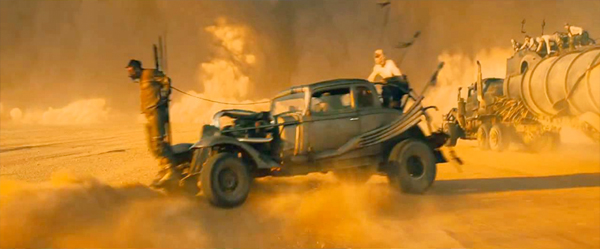
I think the movie, after showing us these five chastity-belted super models, immediately defies our assumptions about how it will portray them, and not by putting guns in their hands. They’re naive but they’re defiant, they’re funny, they’re capable. They stand up for themselves even against Furiosa, insisting on helping in ways she doesn’t think they can, demanding that she not kill Nux, an act of mercy and forgiveness that also ends up saving their lives. (They also gain more clothing the further they get from being treasure, if that’s your issue.)
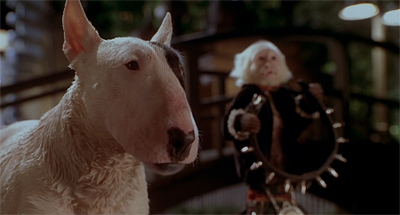 The Wives represent an important part of the movie that Sarkeesian’s comments don’t acknowledge: its dream of a world where this violence is a thing of the past. George Miller may be a genius of “male violence,” but he’s also the big old softie who wrote the BABE and HAPPY FEET movies, heartfelt stories of acceptance, cooperation and community. As I mentioned in my FURY ROAD review, the most powerful scene in Miller’s BABE: PIG IN THE CITY is when Babe saves the life of a bull terrier that is trying to kill him, and makes a loyal friend out of him. This is Miller’s ideal and it’s echoed in FURY ROAD and most of his films.
The Wives represent an important part of the movie that Sarkeesian’s comments don’t acknowledge: its dream of a world where this violence is a thing of the past. George Miller may be a genius of “male violence,” but he’s also the big old softie who wrote the BABE and HAPPY FEET movies, heartfelt stories of acceptance, cooperation and community. As I mentioned in my FURY ROAD review, the most powerful scene in Miller’s BABE: PIG IN THE CITY is when Babe saves the life of a bull terrier that is trying to kill him, and makes a loyal friend out of him. This is Miller’s ideal and it’s echoed in FURY ROAD and most of his films.
The Wives’ mentor or friend Miss Giddy taught them that bullets are “anti-seed,” destroying life. When one of the grizzled, gun-toting Vuvalini brags about how many people she’s killed, the Wife named The Dag laments, “I thought somehow you girls were above all that.”
They’re not, but there is hope for the next generation to turn things around. The woman, called The Keeper of the Seeds, passes on her secret stash of heirloom seeds. The Wives transport this bag and it represents their belief in the possibility of a better world, a hope that no one in the original MAD MAX trilogy ever harbored. And at the end of the movie we have good reason to believe they’re going to be able to grow those seeds. That they, like Sarkeesian, are “redefining our social value system” and want to “re-imagine concepts of power and move beyond the glorification of violence.”
Sarkeesian also retweeted something her producer added:
The way a film is shot creates meaning, as does lighting, makeup, wardrobe, props, sound, editing etc. All are choices that express meaning. — Jonathan McIntosh (@radicalbytes) May 20, 2015
So when an entire production says “THIS IS AWESOME” but the plot/dialogue says “this is bad” we’re left with some serious filmic dissonance.
— Jonathan McIntosh (@radicalbytes) May 20, 2015
This also is taking it too literally, like if you enjoy watching a car crash in a movie you are pro-car crash. What are we afraid of here? That because the pole-swinging chainsaw fighters and guitar blowtorches are awesome, viewers might aspire to a post-apocalyptic age of savage tyranny? I don’t buy it. For the purposes of this discussion, the overall attitude and message are absolutely more important than the (jawdroppingly spectacular) style.
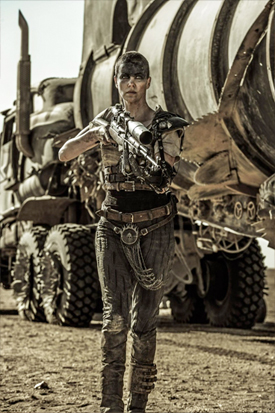 Of course the main reason we’re having this conversation at all is everybody’s favorite character, Furiosa. Let’s leave gender out of it for a minute, and also pretend that action movies are a legitimate artform that reasonable people can enjoy watching without being barbarians. We who love these movies love Furiosa because she’s a great action hero by any standard. She has all of the qualifications. She’s tough and stoic, she looks cool, she knows how to climb across fast moving vehicles, or what to do when dudes on motorcycles keep jumping over the truck dropping grenades. She has a mysterious past. She works for the bad guys, but she’s changing that. She risks everything to do the right thing. She seeks redemption for unspecified sins and revenge for an implied wrong. She steals the movie from the iconic title character, because she’s the one that makes the move, gets the ball rolling, starts the revolution. For the first section of the movie we barely see Max’s face or hear his voice, he’s helplessly strapped to the front of the car while she does the work. When he gets away they go toe-to-toe, and she holds her own. At the end she kills the bad guy and collects the reward for it.
Of course the main reason we’re having this conversation at all is everybody’s favorite character, Furiosa. Let’s leave gender out of it for a minute, and also pretend that action movies are a legitimate artform that reasonable people can enjoy watching without being barbarians. We who love these movies love Furiosa because she’s a great action hero by any standard. She has all of the qualifications. She’s tough and stoic, she looks cool, she knows how to climb across fast moving vehicles, or what to do when dudes on motorcycles keep jumping over the truck dropping grenades. She has a mysterious past. She works for the bad guys, but she’s changing that. She risks everything to do the right thing. She seeks redemption for unspecified sins and revenge for an implied wrong. She steals the movie from the iconic title character, because she’s the one that makes the move, gets the ball rolling, starts the revolution. For the first section of the movie we barely see Max’s face or hear his voice, he’s helplessly strapped to the front of the car while she does the work. When he gets away they go toe-to-toe, and she holds her own. At the end she kills the bad guy and collects the reward for it.
In the world of FURY ROAD these are not male traits. They are survivor traits. But yes, that Furiosa happens to be a woman and Immortan Joe a raping scumbag makes it all the more fun to root for her. It’s great action movie wish fulfillment, like Django fighting slavers or the Basterds killing Hitler or, for some people, Rambo retroactively winning the Vietnam War. It also subverts the paternal trope of the male rescuer or protector. Max isn’t their savior, he’s an obstacle. He has to get with the program, and then he helps out.
His biggest move, actually, is not more “male violence,” but medical care and blood donorship, something it’s hard to imagine crusty old Max doing before the inspiration of all these women. That Furiosa is a woman also makes it more meaningful that the two earn each other’s trust and respect, and say goodbye with a badass nod. They don’t fall in love like a normal male and female lead.
Because I believe in the legitimacy of action movies, I believe that the creation of great action characters is a worthwhile accomplishment. These are two iconic action heroes, one male, one female, and they are equals. If that’s not feminism, fine. But whatever it is I’m for it.
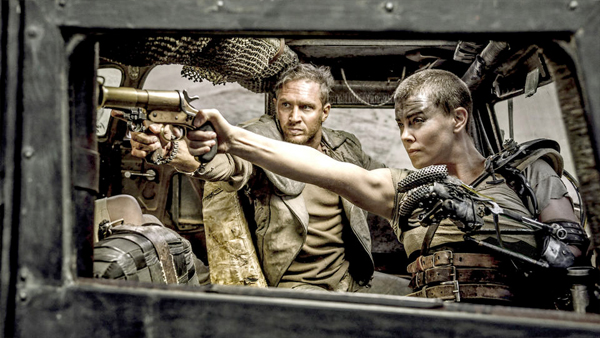

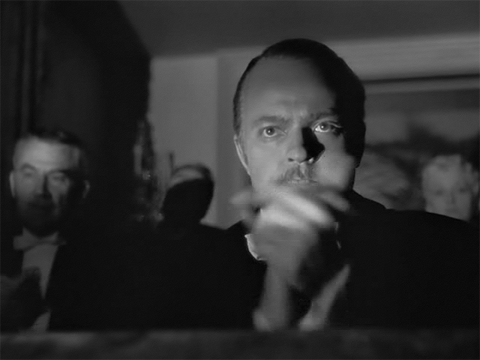


























May 22nd, 2015 at 11:48 am
Great read, but I stay out of that discussion. Sorry.